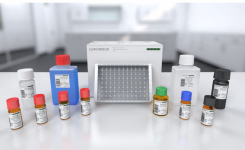| The Food and Drug Administration (FDA) has cleared the first test for use as an aid in the clinical laboratory diagnosis of West Nile virus infection. The West Nile Virus IgM Capture ELISA is intended for use in patients with clinical symptoms consistent with viral encephalitis/meningitis.
"Emerging infectious diseases such as West Nile virus present a challenge to the public health community," said Tommy G. Thompson, Secretary of Health and Human Services. "When industry and government collaborate closely to meet a public health need, the resulting new technology will strengthen our joint efforts to confront diseases earlier and should lower rates of infection."
The new test works by detecting the levels of a particular type of antibody, IgM, to the disease in a patient's serum. IgM antibodies can be detected within the first few days of the onset of illness and can assist in the diagnosis of these patients.
"The rapid review and approval of this blood test, which uses antibody levels to identify persons who were recently exposed to West Nile virus, reflects FDA's commitment to making safe and effective medical products available promptly," said FDA Commissioner Mark B. McClellan, M.D., Ph.D. "This test provides a useful tool to combat the important public health problem of West Nile virus infection, just in time for the start of the West Nile season."
The PanBio West Nile IgM assay was evaluated using over 1000 patient sera, which were tested at four different clinical sites. The test correctly identified antibody in up to 90 to 99% of West Nile virus disease cases. Because detection of antibody is not always specific in patients with acute viral infections, this test is considered presumptive and should be confirmed by more specific testing.
Although the PanBio test is a valuable aid in the diagnosis of West Nile virus encephalitis, due to similarities with other viruses in the same family, there is a need to confirm positive results by an additional test or by using the current CDC diagnostic guidelines for diagnosis of this disease.
West Nile virus is a mosquito-borne virus which first appeared in the United States in 1999. While the virus often presents as a mild infection that clears without further treatment, some patients develop severe infection resulting in neurological disease and even death.
The disease is most prevalent during the peak mosquito season which is expected to begin in July and end in October. Over the past several years, the geographic range of the virus as well as the number of new infections has expanded and now covers most of the continental United States.
Since last September, FDA has also worked very closely with industry to prepare for this upcoming West Nile virus season and has encouraged industry to develop blood donor screening tests. In mid June 2003, blood testing centers began testing the blood supply for West Nile virus, using experimental test kits that FDA has evaluated and permitted to be used. FDA also developed guidance to industry recommending procedures to assess donor suitability and to retrieve and quarantine potentially contaminated blood products. The investigational screening procedure has now successfully identified the first human West Nile virus infection in an asymptomatic blood donor.
The West Nile Virus IgM Capture ELISA is manufactured by PanBio Limited in Windsor, Australia.
FDA article - http://www.fda.gov/bbs/topics/NEWS/2003/NEW00920.html
|
















